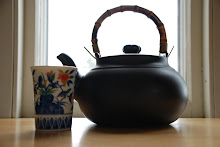
The large bag of Chinese green tea stayed unopened on a shelf dedicated to tea in our kitchen cabinet. The tea was a gift from one of E's graduate students who had declared that it was an example of a typical Chinese green. I removed the tea from its resting place and examined the unopened bag: all Chinese characters, save for several words which I hoped would shed light on the tea's provenance. A quick Google search of the few words I could read revealed the tea to be one from Anhui Province. Supplied thus with this scant knowledge of the tea, I brewed it for 3 minutes, a typical brewing duration for non-Japanese greens, and in water around 170F.
The tea brewed up a liquor that tasted steamed and faintly briny, reminiscent of a Chun Mee, and indeed typical of what you would expect a Chinese green to be.
As I drank my tea, I enjoyed the nuances that continued to surface with each sip. This was one of the rare times drinking tea when I was not armed with descriptions, often fanciful, of the tea's nature, its scents and flavors. There were no passages on the bag -at least, in a language that I could read- extolling the riots of flavors, from steamed artichokes to ripe honeydew melons, that would tickle my palate. I felt unencumbered as I sipped my tea, free to form my own impressions, my appreciation unsullied by preconceptions.
I thought about the reliance that we place on the "liner notes" that often accompany potentially enriching experiences. How many times have I gone to a new exhibit at our art museum and launched forthwith into reading the curator's notes accompanying a work of art before I would feel properly equipped to appreciate the artistic piece? Did I not trust my sensibilities enough to stand before a painting without possessing any prior knowledge of it? I have felt then that my appreciation of the painting would somehow be richer if it were informed by the impressions of an "expert". I was fettered by a desire to make my own impressions congruent with someone else's, and in the end, I found this burdensome.
Now, I brewed a second infusion of this Chinese green tea and detected, without a doubt, a note of overripe honeysuckle.




4 comments:
Great post. I can so relate. I try not to let the existing description influence my experience of a particular tea but that can be challenging sometimes. If I don't detect the flavor notes put forth in the description, I wonder if there's something wrong with my palate that I don't taste the same. It's definitely a journey of learning to be in the moment and trust your own senses. Also, remembering that everyone has their own unique experience with something so subjective as the taste of tea. mmmmm, honeysuckle....sounds divine.
I am glad you are a kindred spirit!
it's hard to truly taste if you're reading at the same time (and trust me, it's something i struggle with daily).
when i do manage to just sit and absorb my cup, it's incredible what arises. thanks for this reminder.
I agree with you - it is too easy to multitask . Even leisure reading done at the same time as drinking my tea can diminish my full enjoyment of the tea experience.
Post a Comment